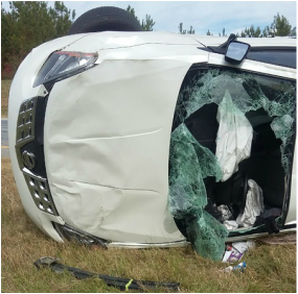 When you are involved in an auto accident in Georgia, waiting on the police to arrive and write a report is always advised. However, you might be surprised to learn that you might not receive a copy of the police's report, also referred to as an accident report, incident report, or crash report, at the scene of the crash. If you are involved in a wreck, you should always get the other parties name in addition to their contact information, driver's license number, car tag, and their car insurance information in case you need to make a claim. In Georgia, there are several ways for you to obtain a copy of the police report: 1. You can contact the records department of the issuing officer's agency, For example, if an Atlanta Police Officer writes the accident report, you can contact the Atlanta Police Department's Central Records Unit at 404-546-7461.
2. You can obtain a copy of the crash report by visiting www.BuyCrash.com. The fees for reports start at $5 and reports are typically available 7-10 business days after the accident. To find a copy of your police crash report, you will need the following information:
3. You can also contact the Georgia Department of Transportation at 404-631-1990 for a copy of the accident report. The cost for a report is currently $5 or $7 for a certified copy. In addition to the police report, you may be able to obtain photographs and other records pertaining to your automobile wreck. It is important to note that Georgia law restricts access to accident reports. Georgia's Open Records Act, O.C.G.A. Section 50-18-72 (a)(5), specifies who can access Georgia accident reports. So, if you were not one of the parties involved in the accident, you want to make sure you have the legal authority to request a copy of the accident report. Likewise, beware if receive unsolicited calls about your accident from a "lawyer referral source" or a lawyer. If you were in an auto accident in Georgia and someone else was at fault, you should contact a Georgia personal injury attorney who can help you understand your legal rights under Georgia law.
 Although almost everyone has been in at least one motor vehicle accident, most of us still wonder what to do after an accident. Often times when motor vehicle accident victims seek compensation for their injuries they learn they do not have all of the information they need. Whether you are involved in a car accident, truck accident, motorcycle accident, or any combination thereof here is a checklist of the top 10 things you should do after an accident to protect yourself and your rights. Bookmark this page so the next time you or a loved one is an accident, you will know exactly what to do. 1. Ensure the Safety of Yourself and Others When possible get yourself and others out of the way of moving traffic. In Georgia, the law also requires you to move the vehicles out of the roadway, if there are no apparent serious personal injuries or death, the vehicle is capable of being normally and safely driven without further damage or hazard to the vehicle, traffic elements, or to the roadway. If there are apparent serious personal injuries or death do not move the vehicles until the police arrive and finish their investigation. 2. Get A Police Report Call the police immediately and report the accident. No matter what offer the other party makes always report the accident and wait for the police to arrive so that a police report can be made. If you make a deal with the other driver and do not get a police report you may cause even greater harm to yourself - especially if they do not keep there end of the deal. 3. Watch Your Mouth Be mindful of what you say and don't make any admissions. Any admissions made at the scene of an accident can be used against you. By no means are we advising you to lie to the police. Answer the questions asked by the police honestly, but limit your conversations with the other driver, passengers, and witnesses. 4. Exchange Information Exchange insurance information with the other driver and make sure you get their name, driver's license number, address, and phone number as sometimes the insured is not the driver. You should also get the other vehicle's tag number. 5. Get Contact Information From Witnesses If you notice anyone who may have witnessed the accident obtain their name, address, and telephone number as soon as possible. Many times witnesses leave once the police arrive and the safety of the accident victims are secured. 6. Take Pictures and Make a Video If you have access to a camera or a camera phone, take pictures of the accident and/or make a video. Make sure you record the condition of both vehicles, the conditions of the accident scene, and the condition of the people involved in the accident. (If family or friends arrive at the scene this is a great task for them.) 7. Seek Medical Attention Health is wealth, so don't gamble on your health. If an ambulance arrives on the scene let them check you out. Once you have been evaluated you can determine what additional emergency medical treatment is needed. If you don't need emergency medical care, you should still seek medical treatment as soon as possible to ensure that you don't have any hidden injuries because after an accident, most people are shaken up and do not feel any pain right away. 8. Take Notes At your earliest convenience, begin taking notes of the circumstances of the accident. If you are able, write down information while you are still at the crash site when it is fresh in your mind. The more details the better. Things to note include but are not limited too:
If it is determined that you need further medical treatment then it is imperative that you follow the doctor's orders. Don't skip appointments, therapy sessions, etc. If you are not satisfied with the treatment you are receiving, then switch doctors as soon as you find someone you are comfortable with. 10. Contact a Personal Injury Attorney Some advertisements may lead you to believe that if you were in an accident you are automatically entitled to money. However, that is not the case. The earlier you contact a personal injury lawyer, such as Maya Simmons Rogers of Simmons Rogers, LLC, the better. An attorney will evaluate your situation and determine if you have a case. If you have a case, your attorney will begin preserving and perfecting all of the necessary evidence. Whether you have a case or not, a good personal injury attorney will also advise you on how to further protect your rights. Even if you feel the accident is your fault, you should still follow these steps because the information you provide and collect might be useful as a part of your defense.  A statute of limitations is a law that essentially sets a deadline for you to pursue legal action against companies or individuals who may have caused you some injury or harm. If you fail to file a lawsuit within that time period, you may forever forfeit your right to pursue compensation for your injuries. These time limits can vary, depending on where you were injured and who or what caused the injury. In general, the Georgia statute of limitations for personal injury claims is two years. If you think you may have a claim for personal injury, first check to be sure that you are within the 2 year time limit. However, be aware there are exceptions to the general rule, which are discussed below. When does the clock start to run? Logic would tell you that the clock starts to run on the date you were injured. In most cases, this is true. Sometimes, however, you may not be aware you were injured because the injury does not affect you immediately. In these cases, the rule of discovery comes into play. The rule simply means that the clock starts to run when you discover or become aware of the harm or injury, rather than when it actually occurred. Claims such as medical malpractice, worker's compensation, products liability, and other types of personal injuries may not be immediately apparent, and in some cases they may not become evident for years after the actual injury occurred. Some circumstances may pause the statute of limitations clock even if you are aware of the injury. This can occur in cases where you suffer a period of incapacity or you are a minor. For example, if you fall into a coma after a truck accident, the statute of limitations is tolled, or paused, until you awake from the coma. For minors, the statute is usually tolled until the minor reaches the age of 18. However, in some cases the law will prohibit you from bringing a lawsuit regardless of when you discovered the injury or how long you were incapacitated. Georgia recognizes a 5 year statute of repose for medical negligence claims. This means that if you are injured by a doctor or medical professional, you must bring the claim within 5 years of the medical procedure or diagnosis. If the symptoms of the injury only become apparent after 5 years, the claim is nevertheless forfeited. When it comes to products liability, in Georgia, a 10 year statute of repose applies to strict liability claims beginning from the date of manufacture. This means that if you are injured by certain dangerous or defective products, you may only bring a lawsuit if the product was manufactured less than 10 years prior to the injury. What if an employee or action of the government injured me? State and Local Governments Pre-suit notice is required before suing a government entity in Georgia. If pre-suit notice is not given within the required time period, you will not be permitted to file a lawsuit against that government entity. In Georgia, the statutes require notice to a county or state government within 1 year of the injury; notice to a city government is required within 6 months of the injury. The Federal Government In order to sue the United States for personal injury, you must go through an administrative process mandated by the Federal Tort Claims Act ("FTCA"). The administrative procedure involves the submission of a Form 95. You must present the Form 95 to the appropriate federal agency within 2 years. Submission of the form, under the rules of the FTCA, tolls the 2 year statute of limitations and triggers a moving statute of limitations. Have you been injured by someone else's negligence? Knowing which time period applies, as well as how to comply with the applicable notice procedure, can be difficult on your own. Likewise, the statutes of limitations vary from state to state. Therefore, you should always consult an attorney if you think you have a personal injury claim. If you have a question about a personal injury you sustained as a result of someone else's negligence, send us an email or give us a call to schedule your free consultation. The Simmons Rogers, LLC law firm will analyze your claim to determine its merit and help you navigate your personal injury claim. |
Simmons Rogers, LLCSimmons Rogers, LLC is a full- service civil law firm based in Atlanta, Georgia. We provide legal services as well as mediation and arbitration services, to businesses and individuals throughout the state of Georgia and beyond. Archives
January 2018
Categories
All
This blog is not intended to be a complete explanation of the law. Its purpose is to inform, not to advise on any specific legal problem or legal rights. If you have specific questions regarding any topic in this blog, you are encouraged to consult the Atlanta based law firm of Simmons Rogers, LLC or an attorney licensed in your
state. |

Simmons Rogers, LLC
4045 Orchard Rd SE, Suite 210 Smyrna, Georgia 30080 Phone: 404-445-8146 Fax: 404-445-8226 E-mail: [email protected] |
LEGAL DISCLAIMER
The information on this website is for informational purposes only and is not legal advice. Use of this website does not create an attorney-client relationship between you and Simmons Rogers, LLC. You should not act upon the information within this website without seeking advice from a lawyer licensed in your own state or country. You should not send any confidential information to Simmons Rogers, LLC until and unless a formal lawyer-client relationship has been established in writing. Unless you have received such written confirmation, we will not consider any correspondence you send us as confidential. |
© 2013-2018. All Rights Reserved. Simmons Rogers, LLC
Attorney Advertising. The choice of a lawyer is an important decision and should not be based solely upon advertisements.
Privacy Policy
Attorney Advertising. The choice of a lawyer is an important decision and should not be based solely upon advertisements.
Privacy Policy


 RSS Feed
RSS Feed